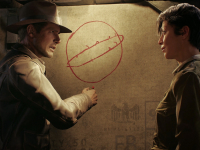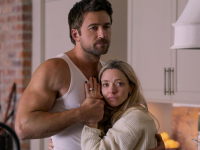
Whenever you get a pairing of such an esteemed director and starring actor as Steven Spielberg and Tom Hanks, it’s easy to assume that the quality of the resulting film will be a foregone conclusion….
After all, Saving Private Ryan is one of the greatest war films ever made and achieved five Academy Awards so it’s fair to say that the pedigree of both Spielberg and Hanks is without question.
Bridge Of Spies tells the 1960’s Cold War story of the capture of Russion spy Rudolph Abel by the USA and the subsequent negotiation for a swap after American U2 pilot Gary Powers is shot down over Russia. Tom Hanks portrays the American attorney James B. Donovan who, with his experience of working at the Nuremburg Trials, is asked to defend the accused Russian. By arguing that Abel could be useful if they need to bargain with the Russians in the future, Donovan manages to secure a sentence of 30 years instead of the death penalty. Sometime afterwards, American U2 pilot Gary Powers is shot down over Russian airspace and fails to activate the top secret plane’s self-destruct sequence before ejecting to safety. As both he and the largely intact plane are arrested by the Russian government, the CIA ask Donovan to act on their behalf and go to post-war East Berlin to negotiate a swap for the two captives. Unfortunately for him, matters are further complicated by the arrest of an American student in Berlin at the same time bringing tensions closer to the boil.

It is the 4th time Tom Hanks has played the lead role in a Spielberg-directed film, following Saving Private Ryan, The Terminal and Catch Me If You Can.
As expected, the quality on show from Hanks as well as the supporting cast is there for all to see with Mark Rylance’s playing of Rudolph Abel particularly strong as it is subtle. The Zeitgeist of the Cold War era is very much a key to the atmosphere as Donovan contends with ill-feeling from the general public as well as his family’s fears, whilst the dire straits of the Berlin people is shown in all its cruelness. Whether coincidence or not, it draws marked resemblance to the real life current problems facing many middle-eastern people as prejudices and fears get the better of them. The locations and settings do well to show the stark contrast of Americans going about their lives with the threat of war against the tyrannical oppression in Germany as the Berlin Wall goes up. Where the film loses points though is in the pacing. It takes half the running time for Abel to be sentenced and when you think the tempo is going to pick up with tensions building after the U2 crash in Russia, the film just keeps steadily cruising along at walking pace. It doesn’t suffer too badly for it but you might find yourself looking at your watch a few times during the last third of the film.
Ultimately, were it not for the excellent performances and vivid settings of dreary Berlin, you might be tempted to give the film a miss until you’re bored one evening and happen to see that it’s on Sky movies. Thankfully, there’s enough talent on display to keep you interested for the majority of the time and the sympathy it draws from you for Rudolph Abel means that instead of inciting prejudice against other nations and their hidden motives, it manages to leave you with a sense of good will.
Author – Steve, Bristol store






